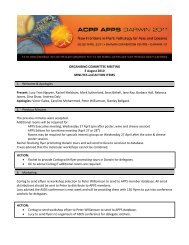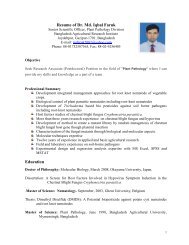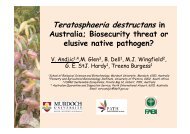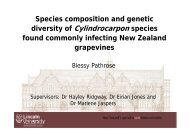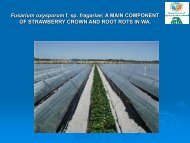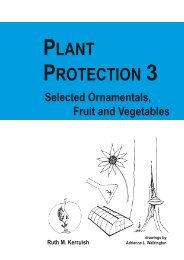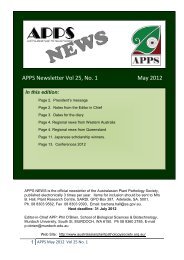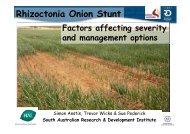PLANT PROTECTION 1 â Pests, Diseases and Weeds
PLANT PROTECTION 1 â Pests, Diseases and Weeds
PLANT PROTECTION 1 â Pests, Diseases and Weeds
You also want an ePaper? Increase the reach of your titles
YUMPU automatically turns print PDFs into web optimized ePapers that Google loves.
<strong>PLANT</strong> <strong>PROTECTION</strong> 1 – <strong>Pests</strong>, <strong>Diseases</strong> <strong>and</strong> <strong>Weeds</strong><br />
Lacewings (Order Neuroptera), various species<br />
feed on black scales.<br />
Scale-eating caterpillar (Catablemma dubia)<br />
use remnant scale coverings to ‘ornament’ their<br />
grey parchment-like cocoons.<br />
Wasps. Larvae of some parasitic wasps prey on<br />
eggs of black <strong>and</strong> other soft scales. Adult wasps<br />
also kill scales by sucking their juice.<br />
– Fungal diseases. Several species, eg Nectria<br />
spp., a red-headed fungus (Fusarium coccophilum)<br />
<strong>and</strong> a felt fungus (Septobasidium sp.) may attack<br />
scales in warm moist autumns <strong>and</strong> cover scaleinfested<br />
branches with a white fungal growth.<br />
Commercially available.<br />
Some predators may be purchased, eg<br />
mealybug ladybird.<br />
Parasitic wasps (Metaphycus spp.) for the<br />
control of black scale <strong>and</strong> soft brown scale on<br />
citrus, olives <strong>and</strong> ornamentals are being<br />
researched.<br />
List of suppliers www.goodbugs.org.au/<br />
Resistant varieties.<br />
Black scale has a wide host range but not all<br />
varieties of a particular species are susceptible, eg<br />
although all citrus varieties are susceptible to red<br />
scale, lemons are preferred.<br />
Plant quarantine.<br />
Avoid introducing infested stock, buds, grafts,<br />
or cuttings into the property or into the<br />
greenhouse. Inspect new arrivals.<br />
Lucid Keys www.lucidcentral.com/ <strong>and</strong> search<br />
for: Scale Insects: Identification Tools for<br />
Species of Quarantine Significance<br />
Pest-tested planting material.<br />
Only plant scale-free nursery stock.<br />
Physical & mechanical methods.<br />
Ants attracted to honeydew produced by soft scales<br />
can be controlled by applying thick sticky b<strong>and</strong>s,<br />
insecticide sprays or baits around the base of<br />
trunks, to trap or kill the ants. Skirt pruning <strong>and</strong><br />
good weed control prevents ants accessing trees.<br />
Insecticides.<br />
Avoid indiscriminate use of persistent broad<br />
spectrum insecticides which kill natural enemies.<br />
Timing. Spray when crawlers can be seen on<br />
leaves <strong>and</strong> twigs <strong>and</strong> no liquid exudes when old<br />
scales are squashed. Later stages have a<br />
protective waxy layer which makes them<br />
resistant to insecticides <strong>and</strong> spray oils.<br />
Spray oils control scales by suffocating the<br />
insect. Plants must be thoroughly sprayed. Oil<br />
will not kill eggs that are under the adult scales.<br />
– Evergreen trees, eg citrus, may be sprayed with<br />
petroleum oil in summer.<br />
– Deciduous trees (< 3 m high) may be sprayed<br />
with petroleum oil when trees are bare in winter.<br />
– Oil sprays also loosen sooty mould.<br />
– Caution when using oils.<br />
If oil is absorbed into the plant, injury will result.<br />
Oils vary in their ability to cause plant injury, the<br />
lower the viscosity of the oil the less likely it is<br />
to injure plants.<br />
Do not spray on days when shade temp is likely<br />
to exceed 35 o C <strong>and</strong>/or soil is dry.<br />
Ensure that the oil-water mixture in the spray is<br />
well agitated to prevent separation.<br />
Oils are available in varying degrees of<br />
refinement.<br />
If applied at the right time <strong>and</strong> with good<br />
coverage oil sprays will kill scale without<br />
injuring beneficial insects or the host.<br />
Contact chemicals are only effective against<br />
crawlers. Adult scales with their waxy coverings<br />
are difficult to kill with contact pesticides.<br />
Contact sprays are devastating to all beneficials.<br />
Systemic chemicals should give good control<br />
of adult scales that are actively feeding. Once the<br />
scale has stopped feeding it is too late to control it.<br />
Systemics are absorbed by the plants so beneficials<br />
are less exposed to them.<br />
Ants repel parasites <strong>and</strong> predators of black scale<br />
<strong>and</strong> spread scale around the property. Increased<br />
ant activity serves as a good guide to presence of<br />
crawlers of black <strong>and</strong> other soft scales.<br />
Table 31. Soft scales – Some insecticides.<br />
What to use?<br />
DECIDUOUS SHRUBS AND TREES, eg ash<br />
Spray oils, eg Pest Oil (petroleum oil),<br />
Bioclear , EcoPest Oil, SK-Enspray99 (paraffinic oil)<br />
EVERGREEN <strong>PLANT</strong>S, eg ole<strong>and</strong>er, citrus<br />
Foliage sprays<br />
Group 1B, eg various products<br />
Group 3A, eg pyrethrin<br />
Group 4A, eg Confidor (imidacloprid)<br />
Group 7C, eg Admiral IGR (pyriproxyfen)<br />
Sprays oils, eg D-C-Tron Plus, Pest oil , Summer oil, White oil<br />
(petroleum oil); Bioclear l , BioPest l , EcoPest l <br />
Oil, various (paraffinic oil); Eco-Oil (botanical oil)<br />
Soap sprays were the original control for scales on the citrus tree<br />
growing at the back door of old homesteads<br />
Soil-applied insecticides<br />
Group 4A, eg Iniator (imidacloprid/fertilizer) – protects young<br />
eucalypts from insect pests including gumtree scale.<br />
Confidor Guard soil insecticide (imidacloprid) is<br />
registered for pink wax scale on citrus<br />
STEM INJECTION – LARGE TREES<br />
Various systemic chemicals are available to kill scale <strong>and</strong> other sap<br />
sucking insects, but they are difficult to control.<br />
When & how to apply?<br />
Dormant oil applications are the preferred spray<br />
for scales on deciduous plants. One spray is<br />
usually enough. They have few or no harmful<br />
effects on parasites <strong>and</strong> predators but require<br />
substantial amount of oil for control <strong>and</strong> there are<br />
no crawlers at that time. Oil sprays smother the<br />
scales, but do not kill the eggs under the adult<br />
scale. Apply after pruning where appropriate.<br />
Do not neglect small infestations. Apply sprays<br />
at the crawler stage, later stages are resistant<br />
to insecticides.<br />
Two sprays during each crawler stage are<br />
necessary because pesticides do not kill the<br />
eggs, the 2 nd spray, therefore, kills crawlers<br />
developing from the eggs still unhatched at the<br />
time of the 1 st spray. A 2 nd crawler stage may<br />
be present sometime in autumn.<br />
The main crawler stage is usually about mid-<br />
December to mid-January but timing will<br />
depend on observation of the stages present <strong>and</strong><br />
increased ant activity.<br />
Ensure appropriate spray volumes are applied<br />
to thoroughly drench trees.<br />
Apply after badly infested areas have been<br />
pruned out, some scales can be washed off.<br />
Seek professional advice. Permits may be<br />
required for stem injection use.<br />
166 Insects <strong>and</strong> allied pests - Hemiptera (bugs, aphids, etc)


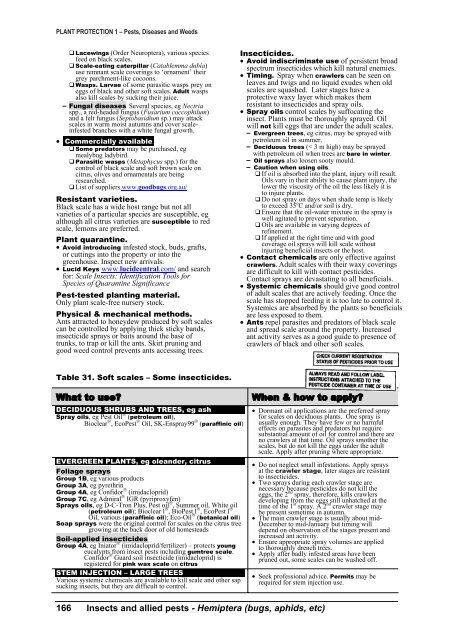



![[Compatibility Mode].pdf](https://img.yumpu.com/27318716/1/190x135/compatibility-modepdf.jpg?quality=85)
